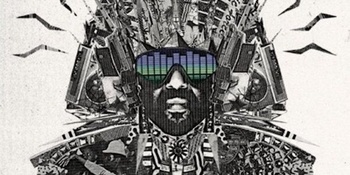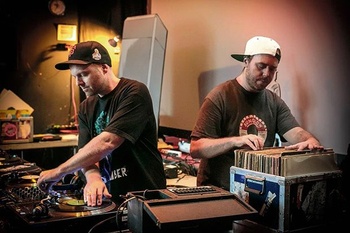The hip-hop pioneer Afrika Bambaataa has donated 40,000 vinyl records to Cornell University in New York. Before they take their place in the archives, however, the discs are touring the world one last time. The sorcerer’s apprentices DJ Shadow and Cut Chemist are taking six turntables with them in order to share the master crate digger’s black gold with us.
Kool Herc did the groundwork; Grandmaster Flash perfected the skills; after that, however, it was the breakbeats, the open spirit, and the record collection of Afrika Bambaataa, alias Master of Records, that took hip-hop culture beyond its home turf in the Bronx. “He made it clear that everything around you can be transformed into a hip-hop context,” says the innovative US DJ Shadow on the eve of his European tribute tour with turntable partner Cut Chemist. “Hip hop is about how you see the world around you. In that sense, you could compare it to punk rock: if you have grown up with a punk-rock mentality and that colours the way you see the world, then it helps to shape your lifestyle and your personality. I was moulded as a hip-hopper, so I started off sampling music in Bambaataa’s tradition, and later in those of Prince Paul, DJ Premier, and Marley Marl.”
Can you still recall the moment when you first heard Afrika Bambaataa’s name and/or his music?
DJ Shadow: I was ten when I heard the single “Planet Rock” on the local R&B radio station. It intrigued me that they sometimes played a vocal and sometimes an instrumental version. I had never heard anything like that before. Later, I would read in interviews and in the acknowledgements on lots of albums why everyone looked up to him so much.
His musical heritage was undeniably an influence on your debut, your breakthrough album Endtroducing….., on which you yourself unabashedly and uninhibitedly sampled existing hip-hop tracks.
DJ Shadow: Sure. Bambaataa was one of the first crate diggers to go looking for obscure records in order to breathe new life into them. And he proved to be tremendously open-minded about it: on his albums, alongside go-go funk and hardcore rap, for example, you also found a cover of “Kick Out the Jams” by the punk band MC5.
DJ Shadow & Cut Chemist play Afrika Bambaataa


(© Derick Daily)
One of his rules was that you couldn’t be satisfied with the music you heard on mainstream radio. You had to dig deeper.
DJ Shadow: Yeah, that’s why, in our set, we don’t only focus on hip-hop classics; we also play soca, calypso, dub music, and even disco. Those genres reflect the public in the South Bronx in the 1970s. Later, of course, Bambaataa became known above all for his B-boy breaks, but when we asked him how he wanted to be celebrated, he himself also placed the emphasis on that openness and progressiveness of the early years.
During the US leg of the tour, he came along for a look. In New York, he appeared on the balcony, “like real royalty”, you observed.
DJ Shadow: He came around to say hello earlier, during the soundcheck, and during the show he went and stood there, where everyone could see him. He was happy to take the applause, but apart from that he was very quiet and unassuming. We could see he had enjoyed it when he turned up again the following evening. But even when he doesn’t turn up in person, he is there every time, because without him we wouldn’t have become DJs.
Was it an advantage to be the owner yourself of a collection of 60,000 records, when it came to putting together a set on the basis of Bambaataa’s 40,000 vinyl discs?
DJ Shadow: Yeah, that experience helped, but it was still a voyage of discovery. There were, of course, all those so-called sure shots, the records he often played during his sets, but whose labels and artwork he had made unrecognisable. So during the selection process we were surprised and educated by the master himself.
One of his rules was that you couldn’t be satisfied with the music you heard on mainstream radio. You had to dig deeper.
DJ Shadow: Yeah, that’s why, in our set, we don’t only focus on hip-hop classics; we also play soca, calypso, dub music, and even disco. Those genres reflect the public in the South Bronx in the 1970s. Later, of course, Bambaataa became known above all for his B-boy breaks, but when we asked him how he wanted to be celebrated, he himself also placed the emphasis on that openness and progressiveness of the early years.
During the US leg of the tour, he came along for a look. In New York, he appeared on the balcony, “like real royalty”, you observed.
DJ Shadow: He came around to say hello earlier, during the soundcheck, and during the show he went and stood there, where everyone could see him. He was happy to take the applause, but apart from that he was very quiet and unassuming. We could see he had enjoyed it when he turned up again the following evening. But even when he doesn’t turn up in person, he is there every time, because without him we wouldn’t have become DJs.
Was it an advantage to be the owner yourself of a collection of 60,000 records, when it came to putting together a set on the basis of Bambaataa’s 40,000 vinyl discs?
DJ Shadow: Yeah, that experience helped, but it was still a voyage of discovery. There were, of course, all those so-called sure shots, the records he often played during his sets, but whose labels and artwork he had made unrecognisable. So during the selection process we were surprised and educated by the master himself.
Was it hard to adapt to playing vinyl again?
DJ Shadow: Yeah. When I stopped playing it about six years ago, it was mainly because the music I wanted to play wasn’t coming out on vinyl any more, and, moreover, I didn’t want to get bogged down in the past. So I started to collect mp3 and wave files. Being reintroduced to vinyl meant that I could play with Cut again. There was an affinity since our first joint set, and sixteen years later it is still there. Hopefully, I haven’t forgotten my skills [laughs], although I’ve never felt I was a real turntablist. I always belonged to the traditional school that sought a balance between pure scratch skills and playing for an audience.
DJ SHADOW’S 5 FAVOURITES FROM BAMBAATAA’S VINYL HERITAGE:
“Message from Malcolm X” (1960s)
“In our set, we also want to present Bambaataa as a progressive social thinker, so we mix in spoken-word recordings from icons of the American civil rights movement, including Jesse Jackson, Malcolm X, and Louis Farrakhan. That comes from a record I had never seen before.”
Chicago Gangsters, “Gangster Boogie” (1975)
“For me, Bambaataa’s legacy as a crate digger took on an extra dimension when it turned out that he often had various versions of the same track: a 12-inch, a coloured vinyl, a foreign pressing, and so on. Neither Cut nor I nor our friends knew that an alternative take of this track existed. Forty years later, we’re still learning.”
Kraftwerk, “Trance Europe Express” (1977)
“Because it was such a crucial record in his career (Bambaataa’s ‘Planet Rock’ is based on a sample of it), we had taken four different original versions along, but they had all been so knocked about that in the end we had to turn to a 1990s compilation.”
Funky 4 + 1, “Superstars” (early 1980s)
“We also discovered a lot of unknown, never released tracks, including this one by an important old-school rap group, which was actually the first hip-hop band from the Bronx to get a record contract and to get to appear on Saturday Night Live.”
Boogie Down Productions, “South Bronx” (1987)
“And there had to be something from the later period too, as we wanted to tell the whole story. This specimen is exceptional, because we think it used to belong to the late Scott La Rock himself: there is a drawing on the sleeve that is clearly by KRS-One and the vinyl grooves on which Scott La Rock’s name is mentioned are completely worn out.”
DJ SHADOW & CUT CHEMIST PLAY AFRIKA BAMBAATAA: RENEGADES OF RHYTHM 20/2, 20.00, €28, Ancienne Belgique, boulevard Anspachlaan 110, Brussel/Bruxelles, 02-548.24.24, www.abconcerts.be
DJ Shadow: Yeah. When I stopped playing it about six years ago, it was mainly because the music I wanted to play wasn’t coming out on vinyl any more, and, moreover, I didn’t want to get bogged down in the past. So I started to collect mp3 and wave files. Being reintroduced to vinyl meant that I could play with Cut again. There was an affinity since our first joint set, and sixteen years later it is still there. Hopefully, I haven’t forgotten my skills [laughs], although I’ve never felt I was a real turntablist. I always belonged to the traditional school that sought a balance between pure scratch skills and playing for an audience.
DJ SHADOW’S 5 FAVOURITES FROM BAMBAATAA’S VINYL HERITAGE:
“Message from Malcolm X” (1960s)
“In our set, we also want to present Bambaataa as a progressive social thinker, so we mix in spoken-word recordings from icons of the American civil rights movement, including Jesse Jackson, Malcolm X, and Louis Farrakhan. That comes from a record I had never seen before.”
Chicago Gangsters, “Gangster Boogie” (1975)
“For me, Bambaataa’s legacy as a crate digger took on an extra dimension when it turned out that he often had various versions of the same track: a 12-inch, a coloured vinyl, a foreign pressing, and so on. Neither Cut nor I nor our friends knew that an alternative take of this track existed. Forty years later, we’re still learning.”
Kraftwerk, “Trance Europe Express” (1977)
“Because it was such a crucial record in his career (Bambaataa’s ‘Planet Rock’ is based on a sample of it), we had taken four different original versions along, but they had all been so knocked about that in the end we had to turn to a 1990s compilation.”
Funky 4 + 1, “Superstars” (early 1980s)
“We also discovered a lot of unknown, never released tracks, including this one by an important old-school rap group, which was actually the first hip-hop band from the Bronx to get a record contract and to get to appear on Saturday Night Live.”
Boogie Down Productions, “South Bronx” (1987)
“And there had to be something from the later period too, as we wanted to tell the whole story. This specimen is exceptional, because we think it used to belong to the late Scott La Rock himself: there is a drawing on the sleeve that is clearly by KRS-One and the vinyl grooves on which Scott La Rock’s name is mentioned are completely worn out.”
DJ SHADOW & CUT CHEMIST PLAY AFRIKA BAMBAATAA: RENEGADES OF RHYTHM 20/2, 20.00, €28, Ancienne Belgique, boulevard Anspachlaan 110, Brussel/Bruxelles, 02-548.24.24, www.abconcerts.be
Read more about: Muziek
Fijn dat je wil reageren. Wie reageert, gaat akkoord met onze huisregels. Hoe reageren via Disqus? Een woordje uitleg.